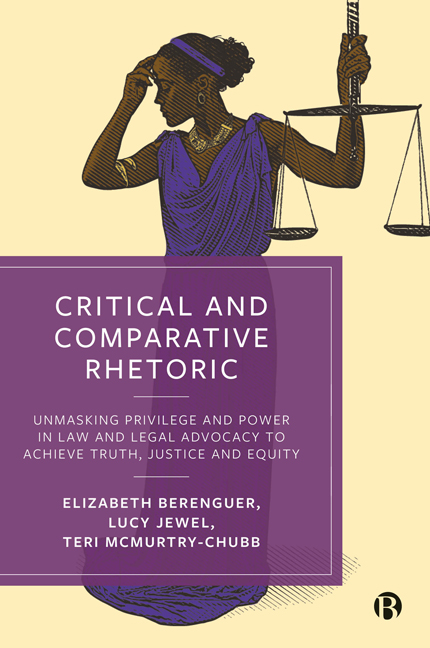 Critical and Comparative Rhetoric
Critical and Comparative Rhetoric Book contents
- Frontmatter
- Contents
- Detailed Contents
- List of Figures and Tables
- About the Authors
- Introduction
- 1 What’s Wrong with Aristotle?
- 2 Problematizing Aristotle: Renovating and Remodeling Traditional Legal Rhetoric
- 3 Shifting the Focus from the West
- 4 Multicultural Rhetorics
- 5 Reproducing the Canon, Reproducing Inequity (Traditional Rhetoric)
- 6 Interrupting the Canon
- 7 Disrupting the Canon: Multicultural Rhetorical Strategies in Action
- References
- Index
2 - Problematizing Aristotle: Renovating and Remodeling Traditional Legal Rhetoric
Published online by Cambridge University Press: 18 January 2024
- Frontmatter
- Contents
- Detailed Contents
- List of Figures and Tables
- About the Authors
- Introduction
- 1 What’s Wrong with Aristotle?
- 2 Problematizing Aristotle: Renovating and Remodeling Traditional Legal Rhetoric
- 3 Shifting the Focus from the West
- 4 Multicultural Rhetorics
- 5 Reproducing the Canon, Reproducing Inequity (Traditional Rhetoric)
- 6 Interrupting the Canon
- 7 Disrupting the Canon: Multicultural Rhetorical Strategies in Action
- References
- Index
Summary
Introduction: legal education's role in maintaining oppressive feedback loops
As explained in Chapter 1, traditional legal rhetoric, based on classical thought structures, silences outsiders, limits the story that can be told, and produces unjust outcomes. Chapter 1 explored the ancient and historic foundations sustaining the oppressive nature of traditional legal rhetoric, providing some examples from U.S. case law. This chapter looks at the same phenomenon, but from the vantage point of contemporary legal education, and in particular how legal education operates as an agent of oppression through its reinforcement and propagation of traditional legal rhetoric.
Within legal education, traditional legal rhetoric creates feedback loops that perpetuate and exacerbate White privilege and patriarchal hierarchy and authority. A feedback loop is a self-reinforcing and cumulative system that locks in inequity and unfair advantage. Within this feedback loop, the tools of stare decisis, originalism, and the legal syllogism are just a few of the legal “institutional feedback loops [that] parlay earlier advantage into continuing advantage.”
Law schools, particularly in the South, were created for the purpose of teaching young men how to preserve and “cultivat[e] the estates they inherited from their fathers.”3 Legal education acted not only as a barrier to entry to minorities and women, but it also locked in the monopoly on political power that Whites had already enjoyed for decades. It did so by securing “self-reinforcing structural processes like social networks and family wealth distribution,” a phenomenon known as the “lock-in model.” Locked-in systems are unlikely to change without intervention.
The lock-in model has two salient features: (1) “unfairness of early anticompetitive conduct”; and (2) “the need for significant … ‘antitrust’ intervention to dismantle White monopoly on advantage.” By focusing exclusively on traditional legal rhetoric as the only acceptable mode of reasoning, legal education reinforces the unfairness of early anticompetitive conduct and can never dismantle the White monopoly on advantage.
A “system switch,” which is an intentional action that dismantles an existing system that has locked in inequality and disparity over time, offers an intervention that can change or replace an inequitable system with another more equitable system or systems. Alternatives to traditional legal rhetoric operate as a system switch capable of dismantling this inequality and the locked-in White monopoly on advantage.
- Type
- Chapter
- Information
- Critical and Comparative RhetoricUnmasking Privilege and Power in Law and Legal Advocacy to Achieve Truth, Justice, and Equity, pp. 36 - 65Publisher: Bristol University PressPrint publication year: 2023


